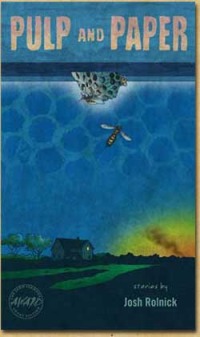
Published by University Of Iowa Press on October 1, 2011
Pulp and Paper is the 2011 winner of the University of Iowa's John Simmons Short Fiction Award for a first collection of short stories. I wasn't familiar with the award until I read this book, but I have to agree that many of these stories are award-worthy.
Four stories are set in New Jersey: "Funnyboy" begins with an attention-grabbing sentence -- "I glanced out the window as my train pulled into the station and saw the girl who killed my son" -- before exploring the issues of guilt and responsibility surrounding a young boy's accidental death, a loss his father cannot accept. Loss is also at the heart of "Innkeeping," a story written from the perspective of a fifteen-year-old whose father has died and whose mother is struggling to keep their inn afloat. The first sentence -- "I wasn't looking for a new father when Tweedy walked into the bar" -- foreshadows the rest of the story.
"The Herald" is both a tribute to the old fashioned art of newspaper reporting and a personal story of a reporter on a sleepy beat who works against deadline to write an exclusive story about the fate of a missing woman. He implores his managing editor to publish the scoop, but is the story accurate? "Mainlanders" is about two boys from a small barrier island and their tongue-tied amazement that two flirtatious mainland girls visiting the beach are actually willing to talk to them. The boys learn how difficult it is to build a bridge between different worlds.
Four stories take place in (mostly upstate) New York. My favorite story in the collection, "Pulp and Paper," tells of a train crash at a paper plant and what rural neighbors will (or won't) do for each other in a time of disaster. The strain on a relationship caused by an unplanned pregnancy is at the heart of "Big River." The pregnancy forces two lovers and lifelong friends to decide whether they want to pursue something more meaningful than the lives for which they seem destined, or whether that destiny -- a marriage, a baby, a quiet town -- carries all the meaning they need.
In my second favorite story, "Big Lake," an accident on a lake kills a boy's teacher and causes her husband to lose his arm. Blaming himself for the accident, another near tragedy forces the boy to come to terms with his feelings of guilt. Set in Coney Island, "The Carousel" is a poignant story about an aging carousel operator who is lost in time.
Josh Rolnick writes with clarity and grace and gentleness. His characters are decent people living quiet lives, confronting life's difficult choices and coping with adversity as best they can. Some are adults, some are kids, but all are authentic.
Occasionally I had the sense that Rolnick was trying a little too hard to be profound, particularly when he stepped away from the story to inject a bit of philosophy. He nonetheless deserves credit for seeking a deeper meaning in common events, simple lives, and familiar experiences, a task at which he often succeeds.
RECOMMENDED